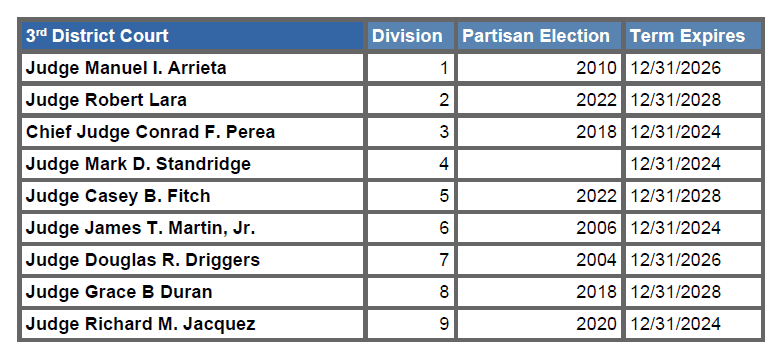Part 1: The resignation of Judge Mark Standridge from the 3rd Judicial District reveals a troubling oversight in nepotism rules and electoral processes.
The resignation of Judge Mark Standridge on November 15, 2023 casts a revealing light on systemic issues within the 3rd Judicial District, spotlighting lapses in the application of nepotism laws and election oversight. This investigation explores the deeper implications of governance and accountability that affect public trust in our judicial system.
Former Las Cruces City Attorney and Assistant United States Attorney, Judge Mark Standridge, announced his resignation effective December 15, 2023. Appointed by Governor Lujan Grisham on February 24, 2023, following the February 2023 retirement of Judge Mary Rosner’s amid controversy, Standridge’s tenure also ended amid controversy. A key issue was the employment of Judge Standridge’s wife as an attorney in the Third District Court, which raised concerns under the existing nepotism rules according to the Administrative Office of the Courts.
Revelations of Nepotism
When it came to light that Judge Standridge’s wife was employed in the same court, the potential conflict of interest prompted the Administrator of the Courts to enforce its nepotism policy. Opting to resign, Judge Standridge stated his decision was to safeguard his wife’s position and career, thus sidestepping a policy meant to prevent such conflicts within the judiciary. The situation raises questions regarding the Judicial Nominating Commission’s transparency and its procedures for addressing potential conflicts of interest.
We reached out to the Dean of the UNM School of Law, Dean Camille Carey who chairs the nomination commissions, asking why the issue of Judge Standridge’s wife’s employment with the Third District Court was not addressed prior to his selection since the intent of the different district nomination commissions is to leverage local insights to review and select the candidates for nomination. Dean Carey declined to comment.
The same question was posed to the Administrator of the Courts who stated the question should be addressed to the Dean of the UNM Law School.
Election Oversight Failures
Further complicating the narrative, an investigation into the judicial appointments revealed a significant administrative oversight. Documents obtained through an IPRA request show that Division 4 of the Third District Court, where Judge Standridge presided, was due for a partisan election in 2024, as the term expires on December 31, 2024. However, this position was never listed for election by the Secretary of State’s office, a lapse discovered only after the primary election proclamation was issued on January 29, 2024.

On February 3, 2024, inquiries were made to the Secretary of State’s office regarding the omission, to which the office responded on February 20, 2024, that it had collaborated with each county clerk and the State of New Mexico Administrative Office of the Courts to verify the accuracy of positions listed in the Proclamation. The subsequent Proclamation had no amendment to the positions on the 2024 Primary Ballot.
Administrative Response
When queried about the omission in February by phone, a representative from the Administrative Office of the Courts explained that judicial positions are filled based on specific criteria and recommendations by the nominating committee. Despite these procedures, the failure to place Judge Standridge’s seat on the ballot raises significant concerns about adherence to electoral rules and the accountability mechanisms within our judicial systems.
We queried again on May 30, 2024, why the district 4 position on the Third Judicial District Court was not on the ballot and was informed by Beth Wojahn, Communications Officer for the Administrative Office of the Courts, “The Secretary of State’s Office determines who is placed on election ballots and that office is the appropriate source of information related to your question.” As we have already noted, the Secretary of State’s office stated it was the duty of the Administrative Office of the Court to provide ballot information.
Timeline of Election Oversight Failures:
- January 29, 2024: A proclamation of the primary election is issued, but the position of Division 4 of the Third Judicial District Court is not listed.
- February 3, 2024: The omission is queried with the Secretary of State’s office.
- February 20, 2024: The Secretary of State’s office responds, stating, “Our office worked closely with each county clerk and the Administrative Office of the Courts to ensure the accuracy of each position pertaining to the Proclamation. If we require an amendment or an update to the Proclamation, this will be posted by March 5, 2024.”
- March 5, 2024: No amendment to the positions on the 2024 Primary Ballot is made.
- May 30, 2024: Another inquiry is made about why the position on the Third Judicial District Court was not on the ballot. Beth Wojahn, Communications Officer for the Administrative Office of the Courts, responds, “The Secretary of State’s Office determines who is placed on election ballots and that office is the appropriate source of information related to your question.”
These oversights may affect the perceived integrity of the judicial appointment process and public trust in the system’s self-regulation and adherence to standards. Accountability and transparency in judicial appointments are crucial for public confidence. We reached out to the Judicial Standards Commission, but they did not answer our calls, do not accept voicemail and have no email address listed on their website.
Conclusion
The resignation of Judge Standridge highlights the need for ongoing scrutiny and possible reforms in the processes governing judicial appointments to ensure they meet the standards of transparency and accountability expected by the public. As this investigation shows, the mechanisms meant to ensure fair and accountable governance require stringent review and reform to restore public trust and uphold justice. This inability to uphold justice was confirmed by the Administrative Office of the Courts noting that the Third Judicial District court is currently under Supreme Court-ordered “Case Management” due to inefficiencies, case backlogs, and violations of constitutional rights to a speedy trial and due process. More on the Third Judicial District in Part 2, the next appointment.
- Opinion | SB 218—New Mexico’s Promise Made, Promise Broken - February 24, 2025
- New Mexico’s Supreme Court Ignores Rights and Restricts Who Can Hear Election Cases - January 9, 2025
- Progressive Blueprint: How EMERGE’s Legislative Surge is Poised to Reshape New Mexico - January 6, 2025


